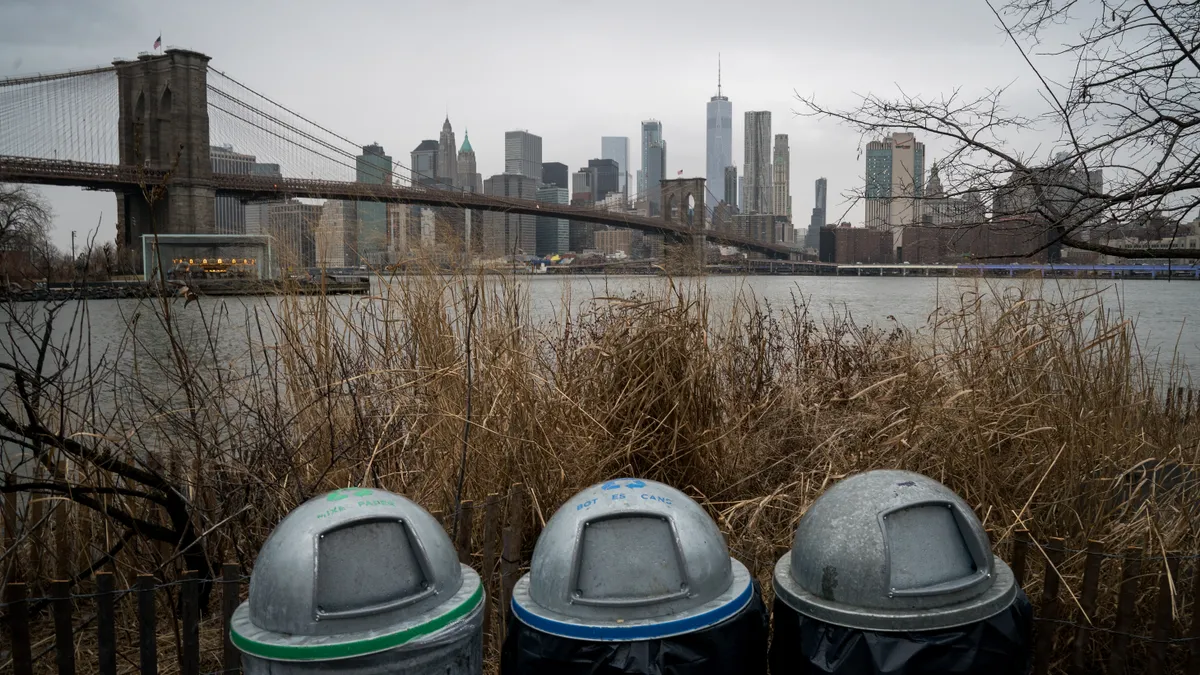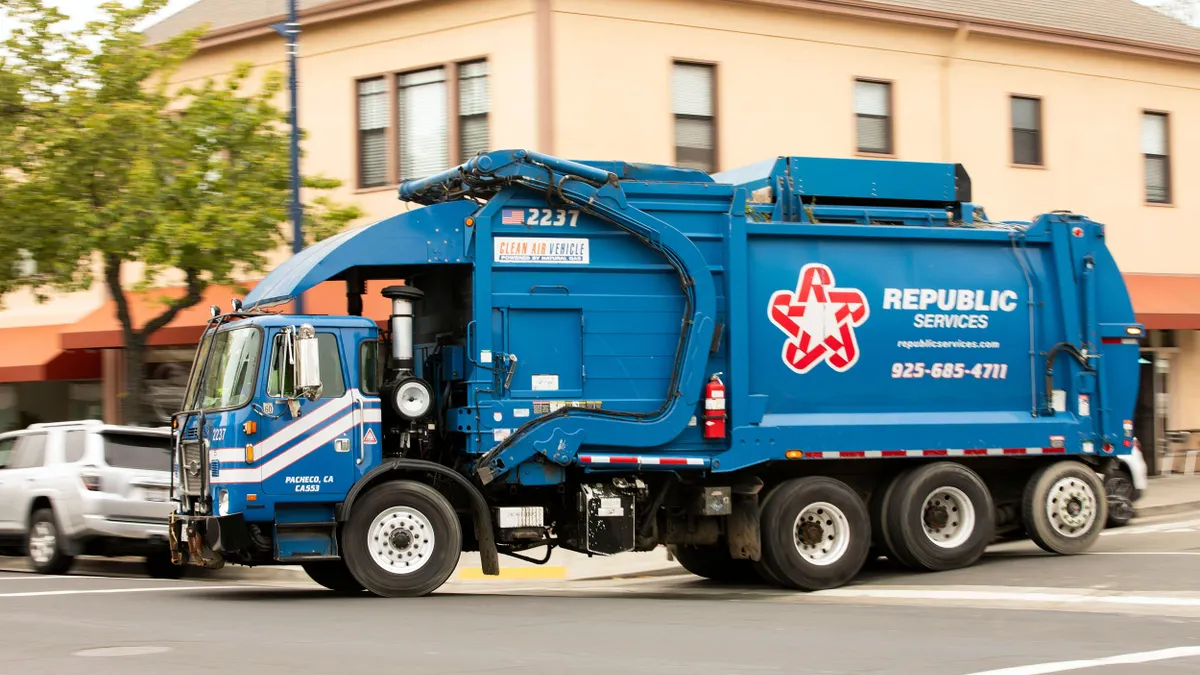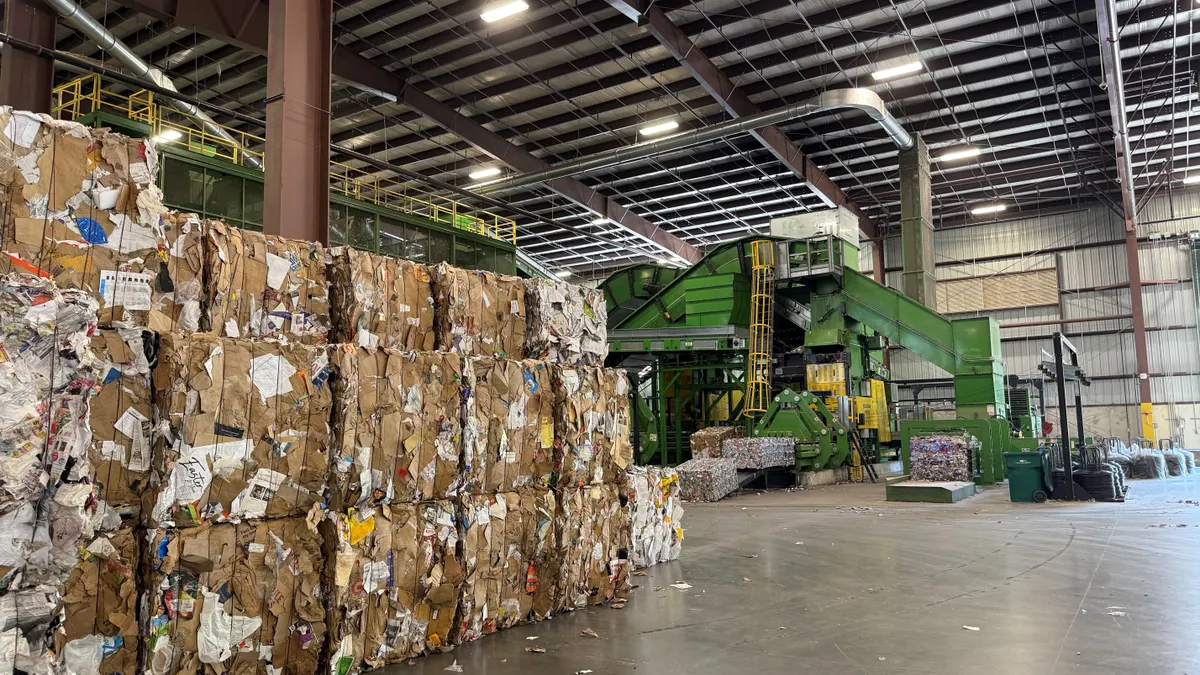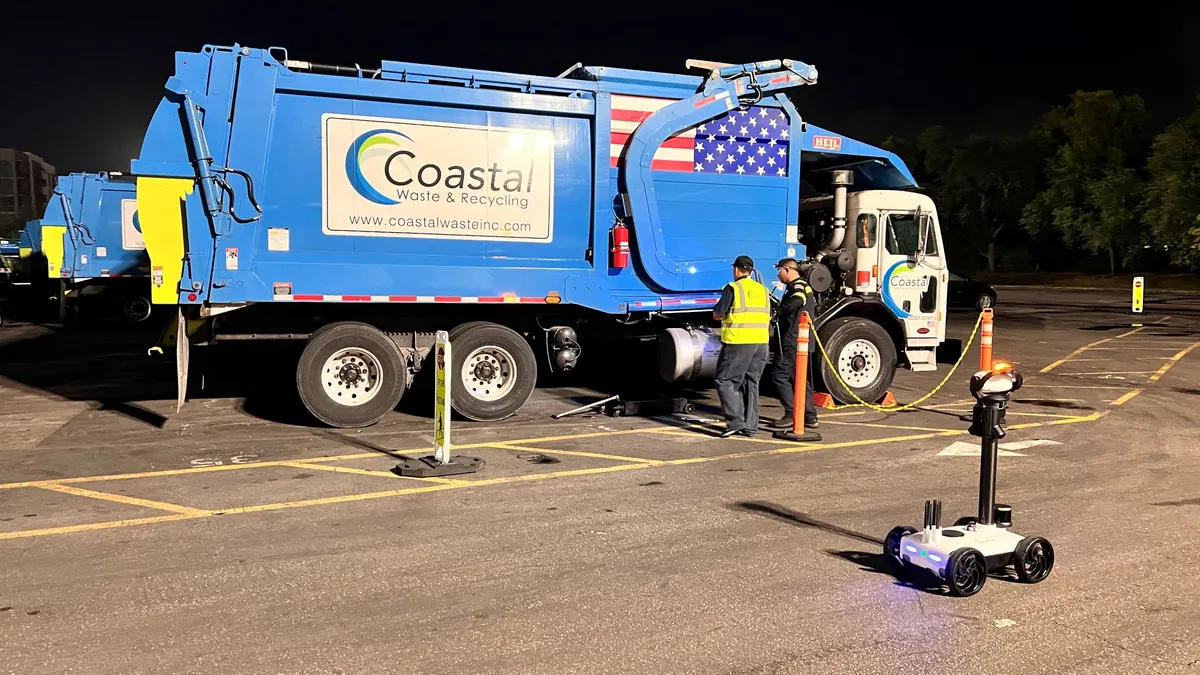New York is reviving multiple programs cut during the pandemic, including curbside organics service, but it is not yet taking the steps many elected officials and advocates believe are necessary to achieve the city's 2030 zero waste goal.
This morning, Mayor Bill de Blasio and the Department of Sanitation (DSNY) announced residential curbside organics service will return earlier than anticipated after being suspended due to 2020 budget cuts. Residents in areas that previously had the program can sign up in August, with service resuming in October. The number of neighborhood dropoff sites will also double, to more than 200, and DSNY will pilot "smart compost bins" that residents can open with an app. Organics collection will also return to nearly 1,000 schools.
In addition, DSNY announced it will schedule reuse swap events throughout the city, and it will "expand opportunities to donate and recycle clothing and textiles." Special waste dropoff sites will reopen in July, and it will increase the number of disposal events for hazardous waste and electronics this year, though curbside electronics collection remains suspended.
"DSNY isn’t just the people who make the trash disappear. We’re a sustainability organization, on Earth Day and every day, committed to making New York the greenest big city in the country," said Commissioner Edward Grayson.
The Earth Day news comes one day after Council Member Antonio Reynoso and former DSNY Commissioner Kathryn Garcia – both candidates for higher office – called for the restoration and universal expansion of residential curbside organics collection as a crucial step toward achieving zero waste. They also called for making participation mandatory as part of a "save-as-you-throw" program to incentivize less disposal.
“We need to be bold as we step forward coming out of COVID and recommit to all of the climate justice issues that we need to make happen," Garcia said at a Wednesday event.
Asked about the proposal during a press conference yesterday, de Blasio said "the question of mandatory to me is a challenging one in terms of what we can ask of people and what's going to work."
In response to this morning's announcement, Reynoso criticized the organics plan as "less than what we had before the pandemic" and doubled down on his prior stance. "It does very little to move the needle on compost," he wrote on Twitter. "No equity, no comprehensive plan to solve actual problems. I'm extremely disappointed at these continued lost opportunities."
The path to 2030
The news follows a sanitation committee hearing in the council on multiple bills yesterday, including two that would codify and require progress reports for a zero waste goal that many no longer consider achievable.
DSNY declined to support the bills while saying the reversal of pandemic budget cuts and passage of extended producer responsibility (EPR) policies could be key factors in accelerating progress toward the 2030 target.
"The department and the city is committed to zero waste, but I think that putting a new calendar date on it is going to be very difficult," Grayson said during the hearing, noting "we will work aggressively to make progress as quickly as possible."
Waste management in New York has always been especially complex, but when de Blasio announced the zero waste goal on Earth Day 2015 it was viewed as a highly aspirational, albeit potentially useful, target. Yet even before the pandemic led to heavy budget cuts at DSNY, it has long been clear to experts that the goal was out of reach.
Fueled by frustration over those cuts and mounting concerns around climate change and environmental justice, elected officials and advocates have become increasingly critical of the administration's progress on what was once hailed as a landmark environmental vision.
"Mayor Bill de Blasio has forced the city council to have to pass legislation to make it mandatory to achieve a goal that you set," said Reynoso, chair of the sanitation committee, yesterday. “Everyone here is over it and looking to do something more meaningful."
The central component of the 2030 goal was to reduce landfill-bound waste 90% from a 2005 baseline. Key initiatives included pledges to provide universal residential organics recycling access via curbside service or drop-off sites by 2018, explore switching to single-stream recycling, improve systems in public housing and schools, expand electronics and textile collection, develop a save-as-you-throw plan, limit single-use plastic bags and reduce commercial waste volumes.
While bans are in place for bags and polystyrene foam, and commercial waste zones are once again moving ahead, many others plans have been tabled or reversed due to budget cuts. According to the New York League of Conservation Voters, the city must consecutively reduce disposal volumes by 8% each year to hit the 2030 target, which has not been happening. In a related metric, the diversion rate for waste managed by DSNY was 18% for FY20 and remains flat based on the latest FY21 data.
Commissioner Grayson hinted yesterday that he was "optimistic" about the revival of certain services due in part to federal relief money, but agency staff also pointed to pending state EPR legislation as another key factor. DSNY supports an EPR bill from state Sen. Todd Kaminsky, who recently said he thinks it could still possibly pass by the summer.
In the meantime, Reynoso and others in the hearing asked the city to pursue the more local concept of save-as-you-throw as a way to incentivize less residential disposal. A $1 million consulting contract was awarded to do this in 2018, but it was never acted upon.
DSNY Deputy Commissioner of Recycling and Sustainability Bridget Anderson said agency staff have done preliminary research and "understand that there will be benefits" to save-as-you-throw, but a full study is still needed to determine local implications. She pointed to the potential for differential pricing in the upcoming commercial waste zone system as one step in that direction.
On the organics front, DSNY also pointed to upgrades at its Staten Island composting site and discussions about potentially expanding codigestion capacity through the city's wastewater treatment network as signs it is preparing for greater activity in the future.
During the nearly three-hour council hearing, numerous people testified about their desire to see the city restore funding for community compost sites, pass more legislation limiting single-use plastics and make moves to reduce disposal exports to communities throughout the region. The latter issue would affect long-term contracts with Waste Management and Covanta. No representatives from large industry companies or trade groups testified during the hearing.
"It is clear that our system of overreliance on excess waste generation and export facilities is not only unsustainable, but polluting and poisoning environmental justice communities and our planet," said Tok Michelle Oyewole, policy and communications organizer at the New York City Environmental Justice Alliance. "It is an act of violence to continue to deem these predominantly Black and brown communities as our city's sacrifice zones, all while exacerbating the climate crisis."
Throughout the day, Reynoso repeatedly blamed the de Blasio administration rather than DSNY staff for stagnant efforts on the 2030 target. Many observers considered it unlikely any major changes would happen in the near term, however, because the mayor and numerous elected officials are term-limited at the end of this year.
"Unfortunately, it's going to end up falling on the hands of our next mayor, who I hope is more committed to achieving these goals than our current one," said Reynoso.




















